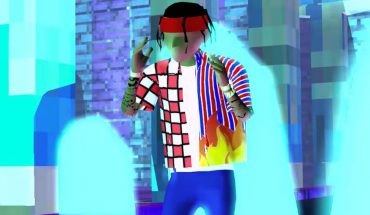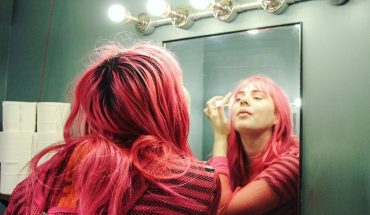“All I wanted to do was climb trees and read books when I was younger, so I didn’t expect any of this to happen,” says Jenny Rossander, a.k.a Lydmor. “I am happy with it. But the little, unpopular girl that’s still in me still pauses and says ‘…This is crazy, all these people are here to listen to me and hear what I’m saying’.”
There is nothing gloomy about this Dane, her eyes too still with thought, her words laced with positivity. The pleasing geometry of her face seeps into her words as she delineates her move from small town girl to international recording artist.
“I was always very creative as a child,” she says. “I wanted to be a movie director for a long time and I also wrote many stories and created cartoons. But when I was 15, I sang a song solo on stage for the first time. I’d sung in a choir before, but when I did it solo I realised it was a way of transferring emotion to people, directly and quickly, and I was totally hooked. I knew then that that was the way I wanted to create things. Immediately afterwards, I started writing my own songs. I also realised that I couldn’t sing other people’s songs. So that meant I had to write my own.”
Hailing from the small Danish town of Aarup, there’s something of the lonesome dove about Jenny. “My parents had a really old battered piano that was out of tune, and I taught myself to play on that, with the help of the internet. I’d print out all the hand shapes for the chords and took it from there.
“I learned things myself. So by the time I was 18, I had been writing songs for three years and people were saying ‘Oh we love the jazz you’re making…’ because I was singing at a piano. And at that time I didn’t know any musicians.
“So I moved to Aarhus and bought some studio equipment, thinking that if I recorded my own songs then I could send them to a record company. It was a revolution for me. I thought then that I could actually be a composer.” Was it trial and error to begin with? “Yeah, I had no idea what I was doing to start with. But slowly I started to get good. Every time I met someone who was involved in music I would ask them questions and get them to tell me what I didn’t know.
“And then I released my first single and I’ve never stopped since then.” Right now she’s a solo act, there not seeming to be enough room on stage for her look and sound and a backing band. But the future might yet find her on a more populated stage under a brighter, more vaulting proscenium arch.
“I’m received quite well in Denmark. I’m not mainstream but you will hear me on the radio there. And to be honest I’m not interested in becoming mainstream or a household name. I do so many things worldwide that I’m not really dependent on becoming mainstream in Denmark.”
How does she fund her career? “I earn my own money by playing shows. I own my own songs. I earn money from touring. I’ve also just recorded a soundtrack for a TV series. I earn a sufficient amount of money that allows me to live. My record label doesn’t pay for me, it works for me.
“I entered the industry at a time when everybody was so depressed, so I am very surprised that things have worked out for me in the way they have because it was understood that there was no money in the business and that you could never make a living. My family was the same, but my mother supported me.
“I quit my job in a call centre four years ago to concentrate on the music. It felt good quitting. But I do feel lucky to be part of this musical generation because we were told that the industry was finished. So we get to define the new way of living off music in the new industry. It’s exciting to be part of it all with things like Pledge Music doing what it does.”
She says she is roused by touring. “Every time I tour in Mexico or Asia or the US people are super nice to me, so that keeps me energised. But last year I had a problem with my own criticism. I was momentarily creatively confused.
“I am the boss of what I do and the creative force has to come from me. I’m the one setting the artistic direction. So when that left me last year, I was confused. I needed to make a change.” What broke the flow? “I don’t know, but perhaps it had to do with a one and a half year old relationship breaking. I was heartbroken. I had also collaborated with people musically that I felt had not represented me properly. I’d got carried away with other people’s creative energy and had forgotten my own. I’m not a natural bridge burner when it comes to relationships, but I had to eventually. There were a few people I couldn’t talk to anymore and it was agreed between us all.
“In the end I was scared and desperate. I needed to find my fire again. So I went off to Shanghai to write. I always thought it was the weirdest place I had ever been. It was like a mystery I couldn’t solve. I felt extremely lost out there but I think I wanted that because when I started to recognise that I was drifting away from myself I knew I had to do something drastic. So Shanghai was a huge burning question mark. It became attractive because of that.”
Jenny moved there for seven months but left Denmark not knowing when she would return. “In certain ways, yes, I was running away from things, but I was also running towards things. At home I was touring a lot and didn’t have the chance to face my demons. I was just living life.” What happened in Shanghai, because she didn’t play any shows, was that she went undercover and didn’t tell people she made music. “There I had the time to finally face all the things that I had been thinking of all these years and to figure out what my next artistic project would be.
“I’m glad I went, because I feel stronger than I’ve ever felt, because I began the album there and now it’s finished. I feel different about the record. I hope people get it because I think it’s special.” A world tour in support of the album will see her touring the US, Asia and South America.
She describes herself as a singer, an electronic musician and a DJ. “I feel like my music and my album are my kids, and it would take a lot to drag me away from music now because I’ve faced the crisis. I went through that dark phase and for a long time afterwards the only thing I had was my relationship with music.
“When I returned from Shanghai I was out of money, I didn’t have a boyfriend, I was very lonely because my friends were scattered around the world, so everything I was excited about was music and making my album. This album was my anchor.” This is the creative process: the ups and downs, the ebb and flow of instinct and passion – in short, the storm that gives birth to creativity and then to a peace.
“Life, my life is a roller coaster,” she says. “There are ups and downs. I can think back to sad times and know that they were part of what makes me who I am today.”
Lydmor’s new LP I told you I’d tell them our story is out next year on Mermaid Records.
Jason Holmes
@JasonAHolmes





